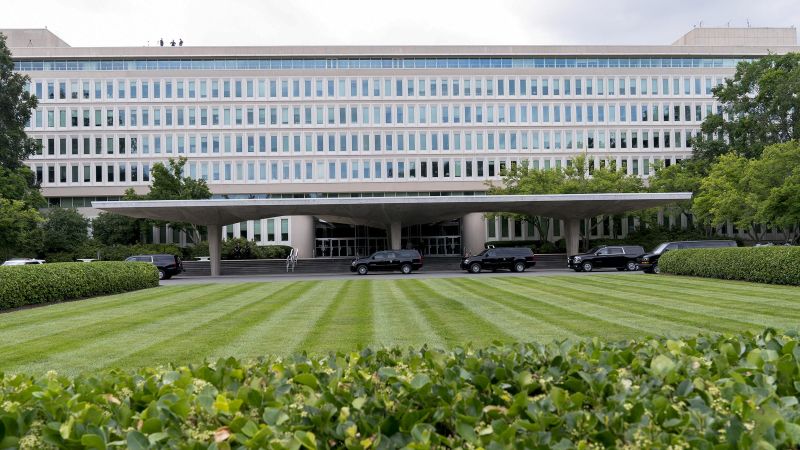Baby Boom or Bust? Why a Hefty Cash Bonus Isn't the Silver Bullet for Falling Birth Rates
Politics
2025-04-25 08:00:51Content

As the United States grapples with declining birth rates, President Donald Trump has floated an intriguing proposal to encourage family growth: a $5,000 "baby bonus" for new parents. This potential incentive comes at a critical time, with a recent CDC report revealing that the nation's fertility rate is teetering near historic lows.
The proposed financial boost reflects growing concerns about changing attitudes among younger generations, who are increasingly hesitant about starting families. Economic uncertainties, rising living costs, and shifting lifestyle priorities have prompted many millennials and Gen Z individuals to reconsider traditional paths to parenthood.
Trump's baby bonus concept aims to provide a tangible financial cushion for new parents, potentially alleviating some of the economic pressures that discourage family expansion. By offering a substantial monetary incentive, the proposal seeks to address the complex demographic challenges facing the United States and potentially reverse the trend of declining birth rates.
While the details of the plan remain preliminary, the initiative signals a recognition of the significant economic and social factors influencing family planning decisions in contemporary American society.
Demographic Dilemma: The Shrinking American Family and the Future of Parenthood
In an era of unprecedented economic uncertainty and social transformation, the United States finds itself at a critical crossroads of demographic change. The traditional narrative of family formation is being dramatically rewritten by younger generations, who are increasingly questioning the economic and personal feasibility of bringing children into an increasingly complex world.Reimagining Parenthood in a Challenging Landscape
Economic Pressures Reshaping Family Planning
The contemporary American landscape presents a formidable challenge for potential parents. Mounting student loan debts, skyrocketing housing costs, and stagnant wage growth have created a perfect storm of financial disincentives for family expansion. Young professionals are meticulously calculating the economic implications of parenthood, often concluding that the traditional path of marriage and children may be financially unsustainable. Emerging research from economic think tanks reveals a stark reality: the cost of raising a child in the United States has increased exponentially over the past two decades. The estimated expense of bringing a child from birth to adulthood now exceeds $300,000, a figure that sends shockwaves through millennial and Generation Z financial planning strategies.Societal Shifts in Reproductive Decision-Making
The declining fertility rate represents more than a statistical anomaly; it signals a profound transformation in societal values and individual priorities. Young adults are increasingly prioritizing personal development, career advancement, and lifestyle flexibility over traditional family structures. Psychological studies suggest that this demographic trend is driven by a complex interplay of factors, including increased educational opportunities, greater career mobility, and a fundamental reimagining of personal fulfillment. The concept of parenthood is no longer viewed as an inevitable life stage but as a deliberate, carefully considered choice.Government Interventions and Policy Considerations
Recognizing the potential long-term implications of declining birth rates, policymakers have begun exploring innovative strategies to incentivize family formation. Proposals like the suggested $5,000 "baby bonus" represent tentative attempts to address the economic barriers to parenthood. However, experts argue that such monetary incentives represent merely a superficial solution to a deeply systemic challenge. Comprehensive family support policies, including affordable childcare, extended parental leave, and robust healthcare systems, are increasingly seen as more meaningful approaches to supporting potential parents.Technological and Cultural Transformations
Advancements in reproductive technologies and changing cultural narratives are simultaneously complicating and expanding the landscape of parenthood. Fertility treatments, adoption alternatives, and non-traditional family structures are providing unprecedented flexibility in how individuals conceptualize and pursue family creation. The intersection of technological innovation and evolving social norms is creating a more nuanced understanding of parenthood, one that transcends traditional biological and social constraints. This dynamic environment offers both challenges and opportunities for reimagining family structures in the 21st century.Global Context and Comparative Perspectives
The United States is not alone in experiencing this demographic shift. Developed nations worldwide are confronting similar challenges, with countries like Japan and several European nations experiencing even more dramatic declines in fertility rates. This global phenomenon suggests that the current trends are not merely local aberrations but reflect broader structural changes in how societies conceptualize work, personal development, and family life. Understanding these interconnected dynamics provides crucial insights into the future of human reproduction and social organization.RELATED NEWS
Politics

Senate Veteran Dick Durbin Drops Bombshell: Illinois Seat Up for Grabs in Surprise Exit
2025-04-23 15:48:13
Politics

Trade Tensions and Diplomatic Dialogues: Starmer's Northern Ireland Summit Amid Trump Tariff Fallout
2025-04-11 10:09:39






